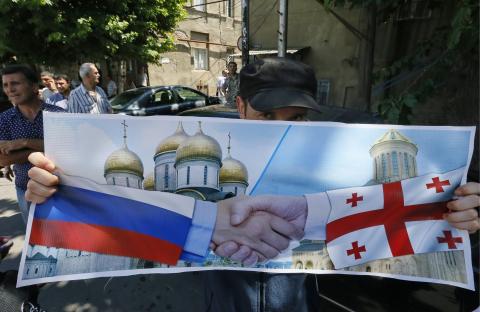ID :
400699
Thu, 03/17/2016 - 11:00
Auther :
Shortlink :
https://oananews.org//node/400699
The shortlink copeid
Relations of Russia, Georgia likely to reach atmosphere of cooperation

PRAGUE, March 16. /TASS/. Russia and Georgia are in talks to get the relationship between the countries back to normal, with economic ties and humanitarian contacts being restored, Russia’s Deputy Foreign Minister Grigory Karasin said in an exclusive interview with TASS on Wednesday after a meeting in the "Karasin-Abashidze" format held in the Czech capital.
Out of deadlock
"A meeting with Zurab Abashidze (Georgian prime minister’s special envoy for relations with Russia - eds. TASS) held today is a milestone as we have been meeting for three years and we have managed to take step by step, gradually, the relations between Russia and Georgia out of the Saakashvili deadlock of mutual hatred and hostility towards a new atmosphere of interaction and cooperation on a wide range of aspects," said Karasin, the state secretary.
"Simultaneously, we have been able to foster these relations in a spirit of mutual respect," he added.
In the meantime, "the work is not easy and not everything is achieved at once," he said.
"Nevertheless, these attempts bring about results and especially in the sphere of humanitarian contacts which have multiplied recently," Karasin said noting Russia’s decision adopted last December to ease visa requirements for Georgians had facilitated it.
"Tourism is on the rise. More Russians are visiting Georgia. Zurab Abashidze told me that according to their estimates, the number of Russian travelers to the country will exceed one million people this year," Grigory Karasin said. "Tourism was approximately at the same level as in 2015."
"Some mothballed issues related to Georgia’s embassy in Moscow and our complex (of buildings) in Tbilisi" were settled at the meeting, he said.
Implementation of the agreements reached in 2011 and linked to Russian-Georgian relations in the context of Russia’s accession to the World Trade Organization (WTO) has made a considerable progress.
"In the near future we will put into practice the projects inked within the framework of these agreements," the Russian deputy foreign minister went on to say.
"Trade has increased considerably over this period of time despite the crisis signs, peculiar to the Russian and Georgian economies," he said. "Trade is on the rise. Russia is Georgia’s second largest trade partner. Georgian wines and Georgian mineral water have settled on tables of the Russians."
"In the current year, a tendency has emerged for a further growth of mutual trade," Karasin said adding contacts between agencies and departments had been developing the most successfully.
"A dozen of our ministries have direct partners in Tbilisi, primarily the transport, culture, and education ministries along with scientific and humanitarian organizations. Russian artists plan their guest performances in Georgia," he said. "In one word, the substance of bilateral relations is becoming more attractive and durable, not subjected to momentary zigzags which used to take place in Georgia’s politics."
Inadmissible rhetoric
Apart from positive moments, the Russian deputy foreign minister voiced his concern over anti-Russian remarks typical for Georgia’s senior officials recently, notifying Abashidze about it.
"In the pre-election fever that gripped Georgian politicians, lots of officials (including ministers and even Georgia’s president) have been indulging in anti-Russian remarks," the diplomat said.
"The rhetoric is unacceptable to us," Karasin went on to say. "Certainly, we are trying to make references to a pre-election atmosphere in the country but at the same time emphasize that such irrespective remarks undermine trust appearing in our relations."
"We categorically oppose any such developments and are hoping that partners will pay heed to our concerns and take appropriate decisions," he said in conclusion.
Karasin -Abashidze format
On December 14, 2012, Abashidze’s first meeting with Karasin took place in a Geneva suburb, the breakthrough after the cutoff of Russia-Georgia diplomatic ties in 2008.
Later on, the senior diplomats held ten meetings in the Czech capital of Prague between 2013 and 2015, with the latest of them on November 19, 2015.
Moscow recognized as independent two Georgian breakaway republics of South Ossetia and Abkhazia, which resulted in the cutoff of Russia-Georgia diplomatic ties. The recognition followed Georgia's attack on South Ossetia that entailed Russia's peacemaking operation in August 2008.
Read more





